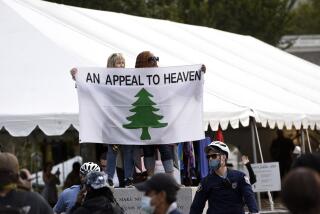U.S. Supreme Court declines case over mountaintop cross
- Share via
TheU.S. Supreme Courtdeclined Monday to hear an appeal from the federal government over whether a highly visible, 43-foot cross can remain atop Mt. Soledad in San Diego.
The issue now returns to the U.S. District Court in San Diego to decide whether the cross should be taken down or whether it can be modified to satisfy a constitutional prohibition against government endorsing a particular religion.
Whatever the District Court decides is likely to be appealed, first to the U.S. 9th Circuit Court of Appeals and then to theU.S. Supreme Court.
The legal dispute about the cross, erected in 1954, has swirled for two decades. The lawyers and litigants have changed but the basic disagreement has remained: Is the cross an impermissible endorsement of Christianity or is it a memorial to all military veterans, including those who have fallen in battle?
Explaining the high court’s action, Justice Samuel Alito appeared to encourage continued litigation: “Our denial, of course, does not amount to a ruling on the merits, and the federal government is free to raise the same issue in a later petition following entry of a final judgment.”
Carl Tobias, who teaches constitutional law at the University of Richmond Law School, said the long fight “just shows the strength of feeling on both sides — people are willing to litigate forever.”
Jewish war veterans, atheists and the ACLU have sued to have the cross removed from what was initially city property. Their lawyers will now petition the District Court to order the cross removed.
In the beginning, the city of San Diego controlled the property beneath the cross. But city officials tired of the legal fight and its cost.
In 2006, Congress passed a law taking control of the property and deeming the cross part of a war memorial. Since the beginning of the litigation, hundreds of plaques honoring individual military veterans have been placed on walls surrounding the cross.
In 2008, a District Court judge in San Diego ruled that the cross could remain. But the 9th Circuit ruled last year that the cross remained an unconstitutional “government endorsement of religion.”
Still, the appeals court did not order the cross removed, suggesting instead that there might be a way it could be modified to pass constitutional muster.
Before the District Court could consider the appellate court ruling, the Department of Justice appealed to the U.S. Supreme Court in hopes of having the appellate court ruling overturned and the 2008 district court ruling affirmed.
On Monday, the Supreme Court declined to consider the Department of Justice request, sending the complex issue back to the District Court in San Diego.
In response to Monday’s denial, David Loy, legal director of the ACLU chapter in San Diego and Imperial counties, said: “The government undoubtedly should honor the sacrifices of our veterans, but it must do so in a way that pays tribute to all our service members, not just those of a particular faith.”
But Rep. Duncan Hunter (R-Alpine), in urging the Department of Justice to continue the legal fight at the District Court, said the government should preserve “such a historic memorial that pays tribute to the service and sacrifice of America’s veterans.”
If the Department of Justice decides to bow out of the case, the Michigan-based Thomas More Law Center will seek to intervene and defend the cross, according to the group’s president and chief counsel, Richard Thompson.
“The cross is a symbol of self-sacrifice, not an attempt to establish a religion,” Thompson said.
The Thomas More Law Center filed a friend of the court brief on behalf of the families of Navy Adm. Jeremiah Denton and Marine Capt. Michael Martino. Denton was a prisoner of war for nearly eight years during the Vietnam War; Martino was killed in Iraq in 2005.
Both families have placed plaques on the base of the Mt. Soledad cross.
More to Read
Sign up for Essential California
The most important California stories and recommendations in your inbox every morning.
You may occasionally receive promotional content from the Los Angeles Times.










